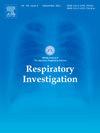Long-term, real-world effectiveness of biologics for severe uncontrolled asthma: The PROSPECT study
IF 2.4
Q2 RESPIRATORY SYSTEM
引用次数: 0
Abstract
Background
Several biologics (BIOs) are available to treat severe uncontrolled asthma. However, there are limited data regarding their long-term effectiveness in real-world clinical practice. We investigated the long-term, over 24 months, effectiveness of initiating a BIO in patients with severe uncontrolled asthma deemed candidates for BIO therapy.
Methods
PROSPECT was a multicenter observational cohort study that enrolled patients with severe uncontrolled asthma in Japan. We divided the patients into two groups according to whether they did (BIO group) or did not (non-BIO group) initiate a BIO within 12 weeks of enrollment. The BIO (omalizumab, mepolizumab, benralizumab, and dupilumab) was chosen at the physician's discretion considering the patient's asthma phenotype.
Results
Of 306 patients enrolled, 285 were included in the full analysis set (BIO group: n = 125; non-BIO group: n = 160). The adjusted least-squares mean change in post-bronchodilator forced expiratory volume in 1 s at 24 months was 0.17 L (95% confidence interval [CI]: 0.11 to 0.23) and 0.04 L (95% CI: −0.02 to 0.10) in the BIO and non-BIO groups, respectively (adjusted difference: 0.13 L; 95% CI: 0.04 to 0.21, P = 0.004). The changes from baseline to 6, 12, and 18 months were significantly greater in the BIO group. Reduction in asthma exacerbations, improvement in 5-item Asthma Control Questionnaire scores, decreased daily oral corticosteroid doses, and higher oral corticosteroid withdrawal rate were observed in the BIO group.
Conclusions
Initiation of a BIO was associated with significant improvements in long-term lung function and asthma control among patients with severe uncontrolled asthma in real-world clinical practice.
Trial registration
University Hospital Medical Information Network clinical trials registry (Japan), UMIN000038006. First registered: September 13, 2019.
生物制剂治疗严重不受控制哮喘的长期、实际有效性:PROSPECT研究
几种生物制剂(BIOs)可用于治疗严重不受控制的哮喘。然而,关于它们在现实世界临床实践中的长期有效性的数据有限。我们研究了在24个月以上的时间里,对被认为需要生物治疗的严重未控制哮喘患者启动生物治疗的有效性。prospect是一项多中心观察性队列研究,纳入了日本严重未控制哮喘患者。我们根据患者是否在入组12周内启动BIO (BIO组)或未启动BIO(非BIO组)将患者分为两组。BIO (omalizumab, mepolizumab, benralizumab和dupilumab)由医生根据患者的哮喘表型选择。结果入选的306例患者中,285例纳入完整分析集(BIO组:n = 125;非bio组:n = 160)。24个月时,BIO组和非BIO组1 s内支气管扩张剂后用力呼气量的调整最小二乘平均变化分别为0.17 L(95%可信区间[CI]: 0.11 ~ 0.23)和0.04 L (95% CI: - 0.02 ~ 0.10)(调整差异:0.13 L;95% CI: 0.04 ~ 0.21, P = 0.004)。BIO组从基线到6、12和18个月的变化明显更大。BIO组哮喘发作减少,哮喘控制问卷5项得分改善,每日口服皮质类固醇剂量减少,口服皮质类固醇停药率升高。结论:在现实世界的临床实践中,开始BIO与严重未控制哮喘患者的长期肺功能和哮喘控制的显著改善有关。试验注册日本大学医院医学信息网临床试验注册,UMIN000038006。首次报名时间:2019年9月13日。
本文章由计算机程序翻译,如有差异,请以英文原文为准。
求助全文
约1分钟内获得全文
求助全文

 求助内容:
求助内容: 应助结果提醒方式:
应助结果提醒方式:


